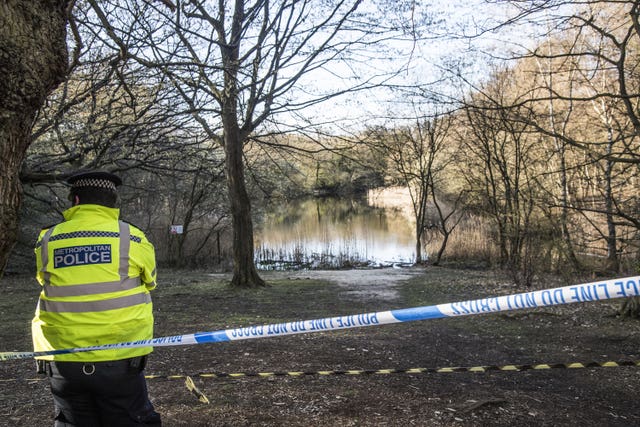A blood donation drive has been launched in memory of a black teenager with sickle cell disorder who was found dead in Epping Forest.
Evidence Joel, the mother of Richard Okorogheye, 19, whose body was found in Essex on April 5, just days after he went missing, said she was grateful to a group of health organisations for “coming together to do something positive in the name of my son Richard.”
Ms Joel, who believes her son’s “legacy lives on through blood donation campaigns like this,” told the PA news agency: “Richard is gone in the physical sense, but I believe he is still with me today.
“Many people who are living with sickle cell are alive today because of the kindness of blood donors from the black community.
Richard Okorogheye's mother, Evidence, speaks about the importance of #BloodDonationThere are still slots available in #Croydon to donate blood as part of the #BondedByBlood campaign this weekend. 🩸Will YOU save lives? 📱Call 03003032805 to book your appointment. pic.twitter.com/wfVFlviuhF
— ACLT Charity (@acltcharity) September 23, 2021
“Saving lives can be simple when it comes to blood donation. Together we can change lives and continue to give hope to sufferers who require ethnically matched blood.”
She is backing the donation drive beginning on Saturday – called Bonded by Blood: A Mother’s Story – which has been created by a group of black health charities including ACLT (African Caribbean Leukaemia Trust), along with community organisations Unsickle My Cells (CIC) and SickleKan.
People who are black African, Caribbean and of black mixed ethnicity are more likely to have the rare blood sub-group Ro that many black sickle cell patients need.
The campaign seeks to encourage them to book an appointment at a series of sessions to be held over three consecutive weekends between September 26 to October 10.
It includes donation sessions in London, Birmingham, Manchester and Bristol, and also has support from NHS Blood and Transplant.
It begins with donation sessions by appointment at Plymouth Grove in Manchester on Saturday and at London’s Harris Invictus Academy in Croydon on Sunday.
Blood donation sessions will be held across London, Manchester, Birmingham and Bristol.
These will take place in September for World Sickle Cell Awareness Month, and October during Black History Month.
— NHS Blood+Transplant (@NHSBT) August 25, 2021
There are currently 15,000 people with sickle cell in the UK which mainly affects people of black heritage.
Mr Okorogheye had been isolating during the coronavirus pandemic and only left home to go to hospital to receive blood transfusions for his sickle cell disorder.
He was last seen leaving his home in Ladbroke Grove, west London, on the evening of March 22.
Ms Joel contacted police the following day, but her son was not officially recorded as missing until 8am on March 24.

Mr Okorogheye was diagnosed with sickle cell disorder at eight months old and endured a lifetime of extremely painful crises and regular stays in hospital.
His mother said his school years included spells where he missed classes because he was in hospital, but a team of supporters – including his family, teachers, school nurses, the GP plus the doctors at the hospital – helped him through this difficult period.
She said: “As a mother of a child who had sickle cell disorder, I know the importance of a sickle cell patient receiving well-matched blood when they desperately need it.”
ACLT is an independent charity that formed in 1996 with the main aim to increase the number of ethnic minorities on the UK stem cell (bone marrow) and blood donation registers.
Beverley De-Gale co-founded ACLT with her husband Orin Lewis after their son Daniel, who was diagnosed with acute lymphoblastic leukaemia when he was six years old, later needed to receive healthy donated stem cells from a donor.
In 1999 her son became the first black person in the UK to receive a stem cell transplant from an unrelated donor.
He then had nearly a decade with his family before he died from multiple organ failure in 2008.
Ms De-Gale said that hearing another mother speak of their “helplessness, sorrow and sheer desperation for their child to be healed was all too familiar”.
She said: “Remembering the feeling of wanting the relevant treatments for Daniel to be available to him at the time he needed it, is what encourages me to lead campaigns such as Bonded by Blood.
“The black community coming together like this will help increase the much-needed blood stocks now, in the future and in particular of the Ro blood subtype, which is more commonly found in black people.
“Many lives depend on it.”
Cynthia Tewogbade, of NHS Blood and Transplant, said: “It is extremely important that people who need transfusions get blood from a donor of a similar ethnicity.
“While we have seen a 29% rise in numbers of black donors. We need 16,000 new donors from black communities this year, as demand for ethnically matched blood has increased by 50%.
“Giving blood is easy, safe, and in just one hour you can save three lives.”
Earlier this month the Independent Office for Police Conduct (IOPC) said it had served misconduct notices on two Metropolitan Police officers following concerns from Ms Joel about the police response after her son was reported missing.
The IOPC said the misconduct notices are in connection with its investigation of complaints by Ms Joel and that this process did not necessarily mean that disciplinary proceedings would follow.




Comments: Our rules
We want our comments to be a lively and valuable part of our community - a place where readers can debate and engage with the most important local issues. The ability to comment on our stories is a privilege, not a right, however, and that privilege may be withdrawn if it is abused or misused.
Please report any comments that break our rules.
Read the rules here